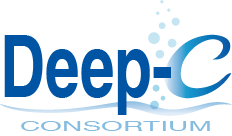WHAT WAS DEEP-C?
Deep-C.org is no longer an active website. The Deep-C (Deep Sea to Coast Connectivity in the Eastern Gulf of Mexico) Consortium was a four-year, interdisciplinary study of deep sea to coast connectivity in the northeastern Gulf of Mexico. The study, which began in 2011, investigated the environmental consequences of petroleum hydrocarbon release in the deep Gulf on living marine resources and ecosystem health. Deep-C examined the geomorphologic, hydrologic, and biogeochemical settings that influence the distribution and fate of the oil and dispersants released during the Deepwater Horizon (DwH) accident, and used the resulting data for model studies that support improved responses to possible future incidents.
The content of this website will remain online to be used as a reference. However, for new research related to the Gulf of Mexico, visit the Gulf of Mexico Research Initiative (GoMRI) website at http://gulfresearchinitiative.org/
EDUCATION & OUTREACH
ROV Maker Day. On October 2, Deep-C visited the Cornerstone Learning Community for a day-long event designed to introduce fifth-graders to ocean science and the use of Remotely Operated Vehicles (ROVs) for deep sea research. The students had the chance to hear from Deep-C scientists. They also built and drove their own ROVs. The event was hosted by Dauphin Island Sea Lab (disl.org).
Deep-C was a four-year, interdisciplinary study of deep sea to coast connectivity in the northeastern Gulf of Mexico.Deep-C is no longer an active research project. The information on this website is for historical reference purposes only.
Home | About Us | Research Areas | Data Center | News & Multimedia | Education & Outreach
© Deep-C Consortium. All Rights Reserved.
This research was made possible by a grant fromThe Gulf of Mexico Research Initiative (GoMRI).
Copyright | Disclaimer | Privacy Policy











